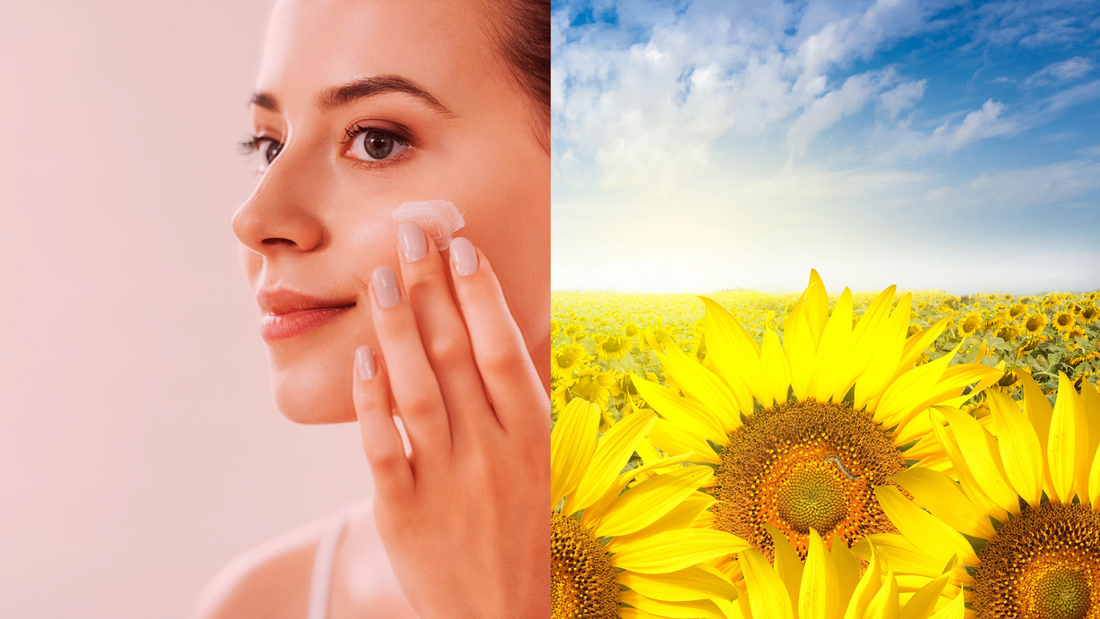
Sunflower Oil Benefits on your Face : For Acne and Wrinkles
Share
De-Clog
Non-comedogenic. You keep hearing that word, but what does it mean? Non-comedogenic is a snazzy way of saying it doesn’t clog pores. What does this have do with sunflower oil? Well, it turns out nature made sunflower oil into a wonderful non-comedogenic oil carrier. Which means it is easily absorbed by your skin and won’t clog your pores. It's also loaded with Vitamin E, and it transports that anti-oxidant, nutrient rich vitamin right into your skin.
Sunflower oil is a good source of Vitamin A and the minerals calcium, magnesium, and iron. It also contains antioxidants, vitamins B2 and E, healthy fats, and polyphenols. It's a great moisturizer to add to your routine. The sunflower seed oil is also soothing and antimicrobial.
It's rich in antioxidants, which protect the skin from oxidative stress. Sunflower oil has been used in hair care for centuries and is a great source of natural waxes and oils. It's very hydrating, and it's also a great source of vitamins A, C, E, B2, B6.
Sunflower seed oil is also very moisturizing and will help to soothe dry skin. You can use it as a moisturizer after you wash your face or after applying a mask or lotion. It will help to give your skin more hydration without feeling greasy or sticky!

De-Oxidize
The following are some of the health benefits of eating vitamin E.
Vitamin E provides protection against aging through its high anti-oxidant levels, but did you know it can help protect against the sun? That’s right, Vitamin E has the ability to absorb ultraviolet energy and prevent it getting to your skin. Ultra violet light plays a big role in free radical production (by increasing it) and contributes to signs of aging.
This natural ability to protect against ultra violet light is the reason you see Vitamin E contained in so many sunscreen products. Incidentally, while we’re discussing sunscreen and non-comedogenic…please make sure to use a non-comedogenic sunscreen and moisturizer.
Less clogged pores mean healthier and clearer skin. Vitamin E also helps protect against skin cancer, wrinkles, and skin aging. Eating vitamin E rich foods can reduce your risk of developing skin cancer. Vitamin E is used in many beauty and health products including Dental Care, Hair Abrasion Treatment, Hair Loss Treatment, and Skin Care.
| Aspect | Sunflower Oil Benefits |
|---|---|
| Non-comedogenic | Easily absorbed by the skin, won't clog pores |
| Vitamins and Minerals | Rich in Vitamin E, A, B2, and minerals like calcium, magnesium, iron |
| Antioxidants | Contains antioxidants, protects skin from oxidative stress |
| Moisturizing | Excellent moisturizer, hydrates and soothes dry skin |
| Anti-Aging | Vitamin E provides anti-aging effects, protects against UV rays and free radicals |
| Acne Prevention | High antioxidant potential reduces the risk of acne breakouts |
| Anti-Inflammatory | Reduces puffiness, swelling, and has anti-inflammatory properties |
Antioxidants and Acne
Antioxidants play an important role in the prevention and reduction of acne and blemishes. According to a study by the National Institute of Health "The data suggests that oxidative stress plays a key role in acne progress and may be employed as a biomarker index to assess the disease's activity and to monitor its treatment."
Thus, we see how the high antioxidant potential of sunflower oil and other natural ingredients can lower the risk of acne breakouts and zits.
Final Tally
So it doesn’t clog pores, delivers anti-oxidant rich Vitamin E to our bodies, and protects against Sun, what else does sunflower oil do for our skin? Glad you asked. Sunflower oil has anti-inflammatory properties. It can reduce puffiness and swelling. Although it hasn’t been proven conclusively to aid in the healing process, reducing inflammation may help the body to heal faster.
Either way, less inflammation is good for our overall body health and our appearance. These attributes made sunflower oil a necessary inclusion in our natural skin care regimen. Check out our Very Toney and Gemma Crema anti-aging serums which include sunflower oil to reduce the signs of aging, reduce inflammation and protect against sun damage.
Further Reading on Sunflower Oil:
National Library of Medicine: https://www.ncbi.nlm.nih.gov/pmc/articles/PMC5796020/


